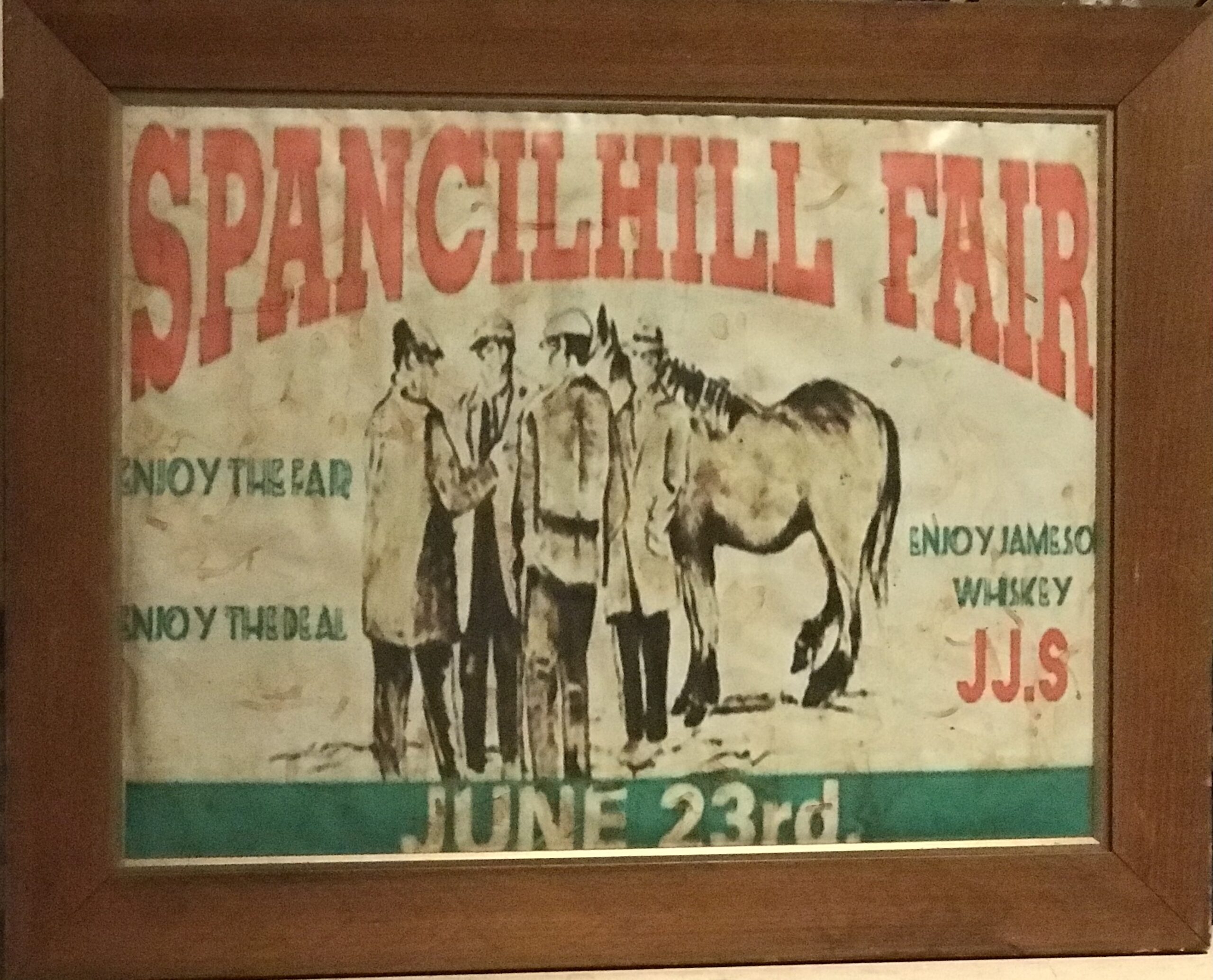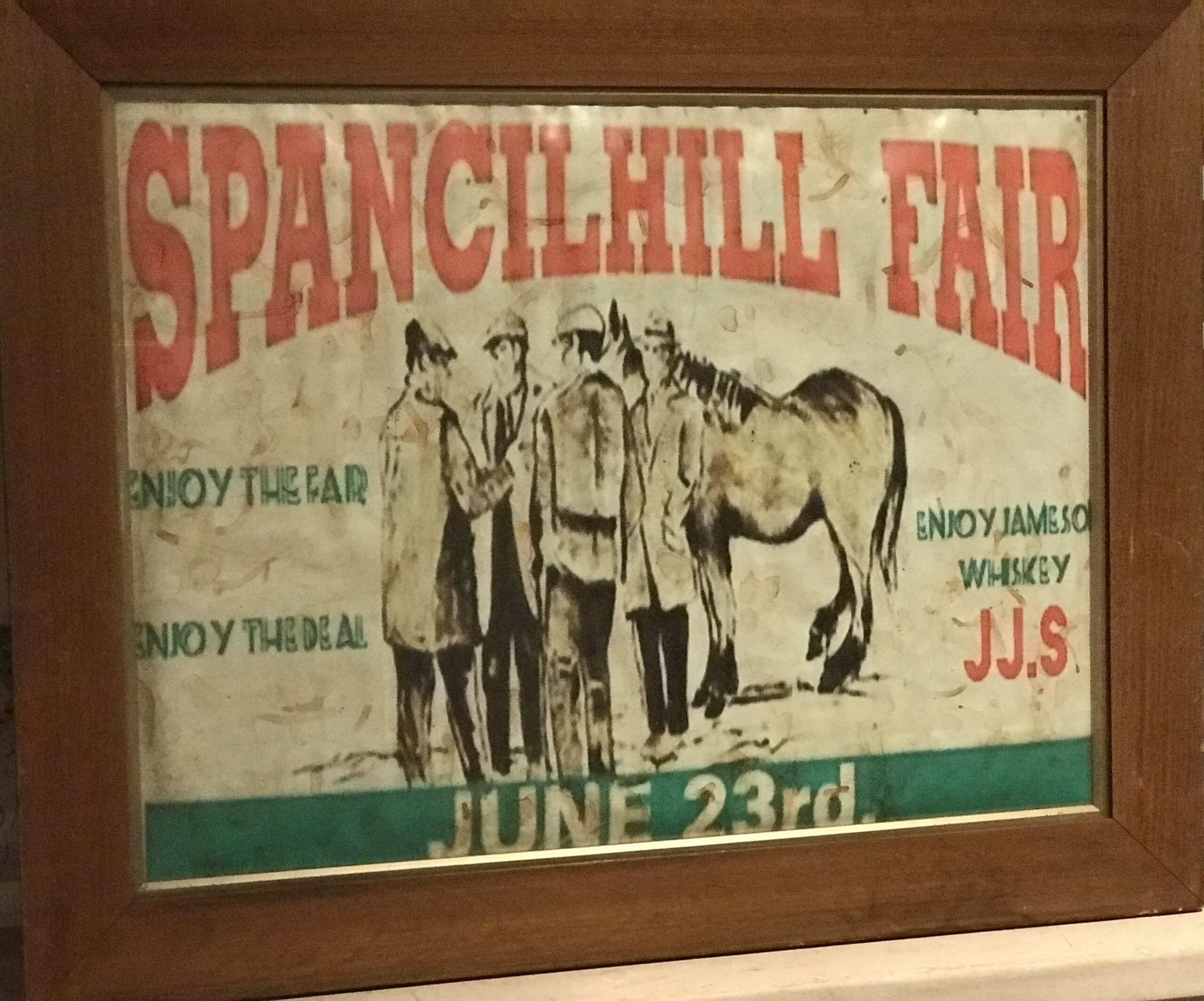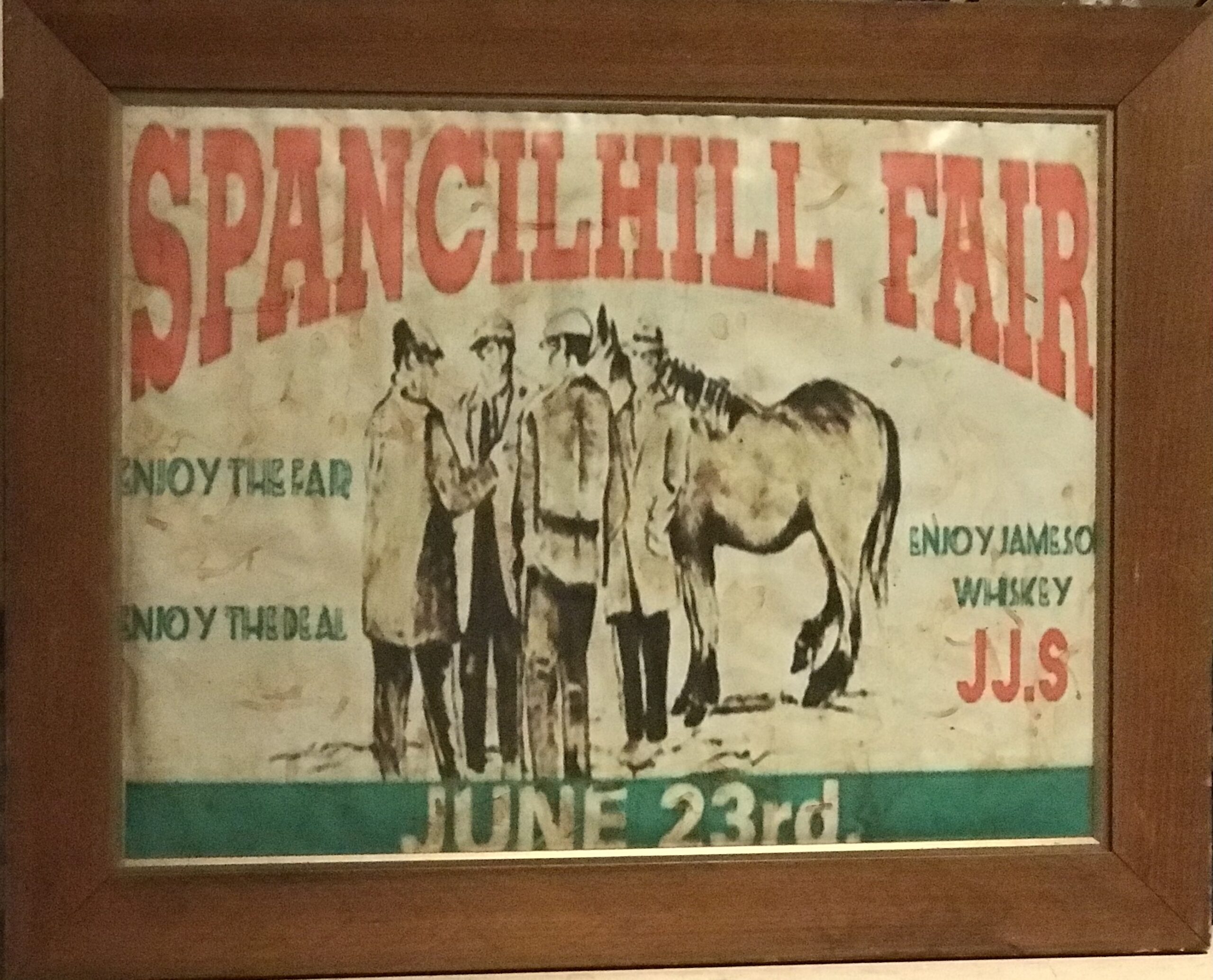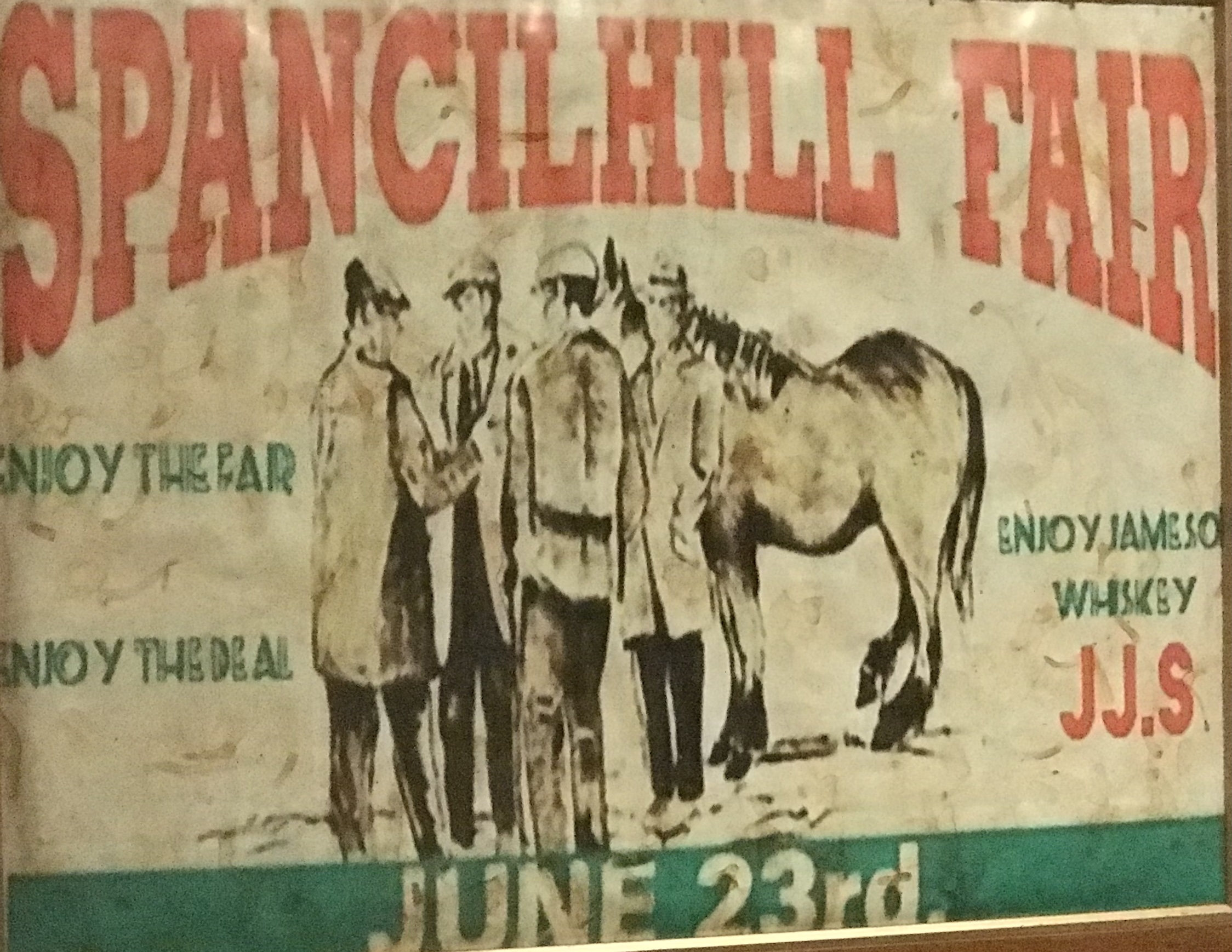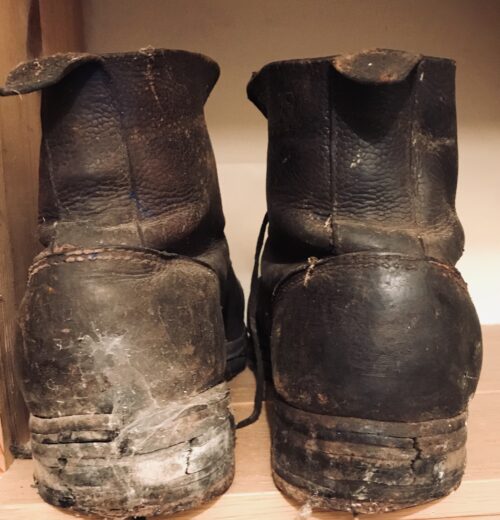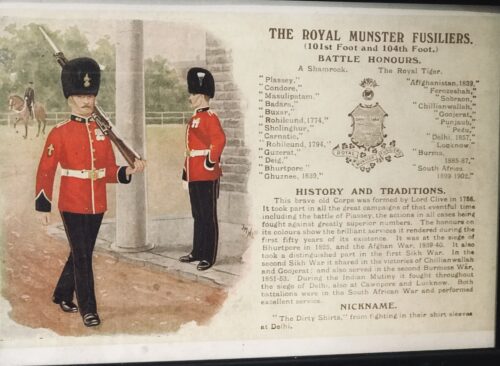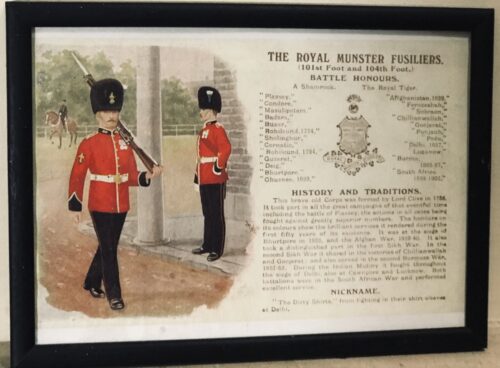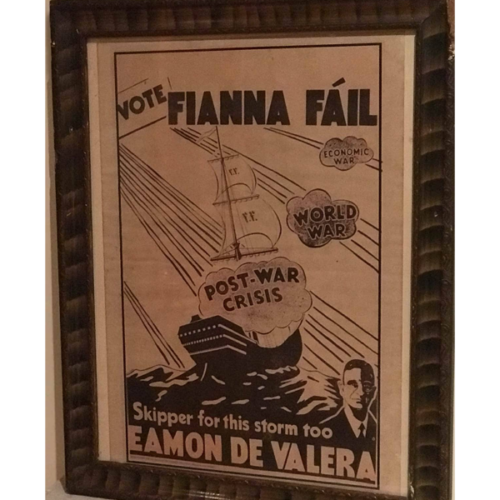Very well reproduced and quaint advertisement for the legendary Fair of Spancil Hill,held every year on the 23rd of June -with Jameson Whiskey sponsoring the advert.
Ennis Co Clare. 50 cm x 60cm
Spancilhill is a small settlement in East County Clare that hosts an annual horse fair on the 23rd of June. The Spancilhill Horse Fair is Ireland’s oldest having been chartered in 1641 by Charles II.
It derives its name from the Irish, Cnoc Fhuar Choille or Cold Wood Hill. The name was misinterpreted as Cnoc Urchaill or Spancel Hill. A spancel is a type hobble and its association with a horse fair perpetuated this misinterpretation.
The 1913 fair saw four thousand horses for sale. The British, Belgian, and French armies sought cavalry mounts. The British army purchased 1,175 horses and lead them tied head to tail to Ennis for rail transport.
Horse Fairs gained a reputation for wild behavior and animal cruelty. The Friends of the Spancilhill Horse Fair formed in the 1980s with the aim of restructuring the event as an agricultural show.
Michael Considine, who emigrated from the area in 1870, composed the popular Irish folk ballad, Spancil Hill.
Buyers across Europe attend with hopes to find international showjumping prospects. Photographers find the event irresistible and nearly outnumber the horses in recent times.The aforementioned song written about the fair has almost become more famous than the fair itself in modern times.
Robbie McMahon was a songwriter and singer whose rendition of Spancil Hill is widely regarded as the definitive version. He reckoned he sang it more than 10,000 times since he learned it as a teenager.
The ballad is named after a crossroads between Ennis and Tulla in east Clare, the site of a centuries-old horse fair held every June. In 1870 a young man from the locality, Michael Considine, bade farewell to his sweetheart Mary McNamara and left for the US. He hoped to earn sufficient money to enable her to join him.
However, he died in California in 1873. Before his death he wrote a poem dedicated to Mary which he posted to his six-year-old nephew, John, back home.
Seventy years later McMahon was given the words at a house party. His singing of the ballad was warmly received by those in attendance, who included the author’s nephew, then an elderly man.
Many singers have recorded the ballad, but McMahon insisted his was the authentic version. He told The Irish Times in 2006: “Nowadays the song is not sung correctly. Many singers put words that are not in it [at] all, singing stuff like ‘Johnny, I love you still’. There’s no ‘Johnny’ in that song.” The late writer Bryan MacMahon was an early admirer of his namesake’s talent and had high praise for his ability as a performer and entertainer.
Singer Maura O’Connell warmed to Robbie McMahon’s “great big personality”, and said that he made Spancil Hill his own.
Born in 1926, he was the third youngest of 11 children, one of whom died in childhood, and grew up on his father’s farm in Clooney, near Ennis. There was music in the family, and all the children sang. Young Robbie was something of a mischief-maker, hence the title of an album he recorded later in life – The Black Sheep.
He began singing in public at the age of 18, and went on to win 16 all-Ireland titles at fleadhanna around the country. In the 1950s, 1960s and 1970s he toured Britain and the US with a troupe of traditional musicians under the auspices of Comhaltas Ceoltóirí Éireann.
As a songwriter, he is best known for the Fleadh Down in Ennis, which celebrates the 1956 all-Ireland fleadh cheoil. Other compositions include Come on the Banner, the Red Cross Social and the Feakle Hurlers, in honour of the 1988 Clare county champions.
A lilter, he was renowned for his performance of the Mason’s Apron, in which he simulated the sound of both the fiddle and accompanying banjo.
Possessed of a store of jokes, ranging from the hilarious to the unprintable, he was as much a character as a singer and was more comfortable with the craic and banter of casual sessions than with formal concerts.
He was the subject of a film documentary Last Night As I Lay Dreaming. Clare County Council hosted a civic reception in his honour in 2010, and he was the recipient of the Fleadh Nua Gradam Ceoil in 2011.
He is survived by his wife Maura, daughters Fiona, Noleen and Dympna and son Donal.

